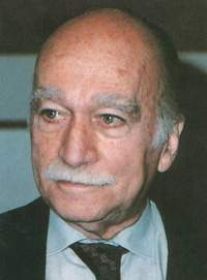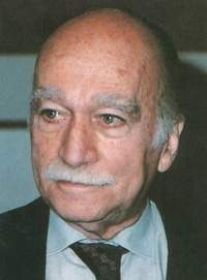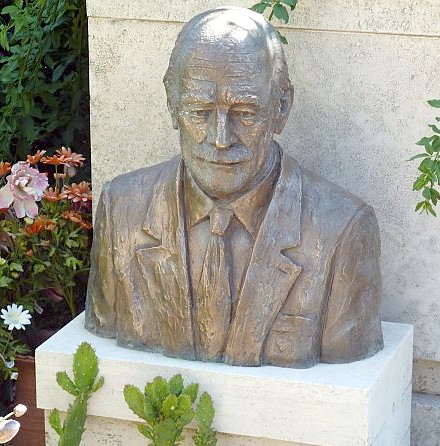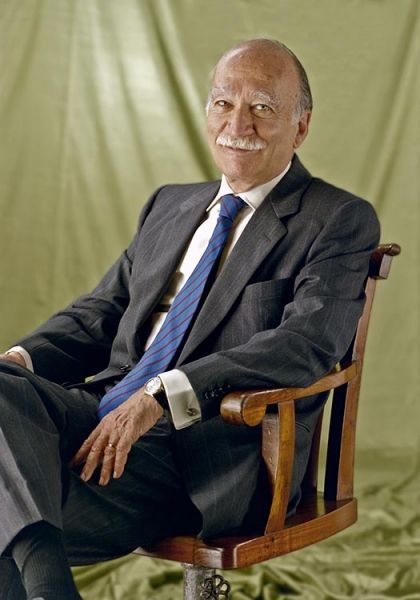The grandfather of Giorgio was Nuncio Almirante (1837- 1906) and his great grandfather was Pasquale Almirante (1799-1863)
Giorgio spent his childhood following his parents, who worked in the theater, in Turin and Rome. Here he studied under Giovanni Gentile, the then pre-eminent pro-fascist philosopher. He graduated in literature in 1937.
Trained as a schoolteacher, Almirante instead wrote for the Rome-based fascist journal Il Tevere. A minor figure in the National Fascist Party, whose chief claim to fame was a venomous polemic with Julius Evola on how fascism was to be implemented. He maintained the materialistic view of biological view, while his opponent preferred a more spiritual take on the matter. In this respect he was influenced by the journalist Telesio Interlandi, who was his ideological mentor. A journalist by profession, Almirante wrote extensively for Interlandi's journal La difesa della razza.
Almirante also helped to organise the Italian Social Republic, being appointed Chief of Cabinet of the Minister of Culture in 1944. A second-tier figure at best, even in the last throes of the Italian fascist regime, Almirante was mentioned in the memoirs of an RSI veteran as "eating and talking all the way through an official dinner speaking in grandiose and cryptic terms of secret weapons and smiling to himself as he did know secrets beyond his guests' comprehension".
Following the defeat of fascism Almirante was indicted on charges that he ordered the shooting of partisans in 1944, although a general amnesty saw this lifted. He initially fled Italy after the war but returned in 1946 to set up his own small fascist group which was quickly absorbed into the Italian Social Movement, which was set up the same year. Almirante was chosen as leader of the new party in part because of his low profile, as the higher ranking members of the fascist regime involved in the Italian Social Movement opted instead to take on behind the scenes roles. Representing a radical faction within the party, Almirante's group lost ground as more moderate elements gained influence in the party; this tendency soon gained the upper hand, forcing Almirante to give way to Augusto De Marsanich as leader in 1950. He had intimated his support for the Europe a nation ideas prevalent at the time but failed to convince the party to take a position against De Marsanich's pro-NATO policy.
During the mid 1950s Almirante, disquieted by the drift towards conservatism under De Marsanich and his successor Arturo Michelini, resigned his position on the National Council to become a critic of the leadership. He emphasised the proletarian origins of fascism against the new conservatism and argued for 'quality' rather than 'quantity' in government, endorsing expert-driven elites instead of liberal democracy. However, he stopped short of the route taken by the other leading dissident Pino Rauti by remaining within the party. Like Rauti however he became increasingly influenced in his thought by Evola, even hailing the philosopher as "our Marcuse - only better"
Almirante regained the leadership of the party in 1969 following the death of Michelini. By now his own opinions had shifted somewhat towards a more moderate position as he soon declared his own support for democracy. On this basis he aimed to attract more conservative elements to the Italian Social Movement, while simultaneously passing reforms that strengthened the power of the party secretary in order to pre-empt opposition from the radical tendency with which he had previously been associated. He also sought to 'historicise' fascism and dropped the more overt references to the ideology from Italian Social Movement propaganda and rhetoric, notably shelving the black shirt and the Roman salute.
Dogged by poor health, Almirante stepped down as leader at the 1987 National Congress and saw the leadership pass to his protégé Gianfranco Fini.
ROME, May 22— "Giorgio Almirante, who had a minor role in Mussolini's last government and was a founder and longtime leader of Italy's small but vocal neo-Fascist party, died today. He was 73 years old.
Mr. Almirante, who suffered from heart disease for years, died of complications of ischemia, a condition caused by arterial blockage, according to hospital officials quoted by the Italian news agency ANSA.
At his side when he died, the agency said, were his wife, Rafaela, their four children, and the current leader of his party, GianFranco Fini.
Elected to the Chamber of Deputies 11 times from 1948 to 1987, Mr. Almirante had been charged with helping a right-wing terrorist, but the charges were dropped under a 1987 amnesty.
His party, the Italian Social Movement, was the political heir to Mussolini's Fascism. By 1987, it had become Italy's fourth-largest party in Parliament, holding 5.9 percent of the seats in the Chamber of Deputies.
Another former party leader, Pino Romualdi, died of cancer Friday. Mr. Romualdi, 77, was editor of the party newspaper. He served in the Chamber of Deputies between 1953 and 1979 and was a Senator from 1983 to 1987.
The party announced that a joint funeral for Mr. Almirante and Mr. Romualdi would be held Tuesday at St. Agnes Church in the Piazza Navona here.
Mr. Almirante was born June 27, 1914. He joined Mussolini's last government in 1943 as chief of staff of the Ministry of Popular Culture and served until the end of World War II.
In February 1979, the Chamber of Deputies removed Mr. Almirante's parliamentary immunity so prosecutors could try him for reviving the outlawed Fascist Party. But he was re-elected to Parliament and the immunity-lifting process had to begin again. He never went to trial.
Parliament again deprived him of immunity in 1981 and 1984 so that he would have to face charges of aiding a right-wing terrorist accused in a 1972 bombing that killed two policemen. Mr. Almirante was charged with helping finance surgery to change the vocal cords of a bombing suspect so he could dodge his identification by voice patterns.
Those charges were dropped under a February 1987 amnesty that covered offenses carrying less than a three-year term.
In December, Mr. Almirante stepped down as national secretary of the Italian Social Movement, which supports a halt to the influx of immigrants, a stronger presidency and tougher measures against organized crime."
Source: New York Times. 23 May 1988.
The grandfather of Giorgio was Nuncio Almirante (1837- 1906) and his great grandfather was Pasquale Almirante (1799-1863)
Giorgio spent his childhood following his parents, who worked in the theater, in Turin and Rome. Here he studied under Giovanni Gentile, the then pre-eminent pro-fascist philosopher. He graduated in literature in 1937.
Trained as a schoolteacher, Almirante instead wrote for the Rome-based fascist journal Il Tevere. A minor figure in the National Fascist Party, whose chief claim to fame was a venomous polemic with Julius Evola on how fascism was to be implemented. He maintained the materialistic view of biological view, while his opponent preferred a more spiritual take on the matter. In this respect he was influenced by the journalist Telesio Interlandi, who was his ideological mentor. A journalist by profession, Almirante wrote extensively for Interlandi's journal La difesa della razza.
Almirante also helped to organise the Italian Social Republic, being appointed Chief of Cabinet of the Minister of Culture in 1944. A second-tier figure at best, even in the last throes of the Italian fascist regime, Almirante was mentioned in the memoirs of an RSI veteran as "eating and talking all the way through an official dinner speaking in grandiose and cryptic terms of secret weapons and smiling to himself as he did know secrets beyond his guests' comprehension".
Following the defeat of fascism Almirante was indicted on charges that he ordered the shooting of partisans in 1944, although a general amnesty saw this lifted. He initially fled Italy after the war but returned in 1946 to set up his own small fascist group which was quickly absorbed into the Italian Social Movement, which was set up the same year. Almirante was chosen as leader of the new party in part because of his low profile, as the higher ranking members of the fascist regime involved in the Italian Social Movement opted instead to take on behind the scenes roles. Representing a radical faction within the party, Almirante's group lost ground as more moderate elements gained influence in the party; this tendency soon gained the upper hand, forcing Almirante to give way to Augusto De Marsanich as leader in 1950. He had intimated his support for the Europe a nation ideas prevalent at the time but failed to convince the party to take a position against De Marsanich's pro-NATO policy.
During the mid 1950s Almirante, disquieted by the drift towards conservatism under De Marsanich and his successor Arturo Michelini, resigned his position on the National Council to become a critic of the leadership. He emphasised the proletarian origins of fascism against the new conservatism and argued for 'quality' rather than 'quantity' in government, endorsing expert-driven elites instead of liberal democracy. However, he stopped short of the route taken by the other leading dissident Pino Rauti by remaining within the party. Like Rauti however he became increasingly influenced in his thought by Evola, even hailing the philosopher as "our Marcuse - only better"
Almirante regained the leadership of the party in 1969 following the death of Michelini. By now his own opinions had shifted somewhat towards a more moderate position as he soon declared his own support for democracy. On this basis he aimed to attract more conservative elements to the Italian Social Movement, while simultaneously passing reforms that strengthened the power of the party secretary in order to pre-empt opposition from the radical tendency with which he had previously been associated. He also sought to 'historicise' fascism and dropped the more overt references to the ideology from Italian Social Movement propaganda and rhetoric, notably shelving the black shirt and the Roman salute.
Dogged by poor health, Almirante stepped down as leader at the 1987 National Congress and saw the leadership pass to his protégé Gianfranco Fini.
ROME, May 22— "Giorgio Almirante, who had a minor role in Mussolini's last government and was a founder and longtime leader of Italy's small but vocal neo-Fascist party, died today. He was 73 years old.
Mr. Almirante, who suffered from heart disease for years, died of complications of ischemia, a condition caused by arterial blockage, according to hospital officials quoted by the Italian news agency ANSA.
At his side when he died, the agency said, were his wife, Rafaela, their four children, and the current leader of his party, GianFranco Fini.
Elected to the Chamber of Deputies 11 times from 1948 to 1987, Mr. Almirante had been charged with helping a right-wing terrorist, but the charges were dropped under a 1987 amnesty.
His party, the Italian Social Movement, was the political heir to Mussolini's Fascism. By 1987, it had become Italy's fourth-largest party in Parliament, holding 5.9 percent of the seats in the Chamber of Deputies.
Another former party leader, Pino Romualdi, died of cancer Friday. Mr. Romualdi, 77, was editor of the party newspaper. He served in the Chamber of Deputies between 1953 and 1979 and was a Senator from 1983 to 1987.
The party announced that a joint funeral for Mr. Almirante and Mr. Romualdi would be held Tuesday at St. Agnes Church in the Piazza Navona here.
Mr. Almirante was born June 27, 1914. He joined Mussolini's last government in 1943 as chief of staff of the Ministry of Popular Culture and served until the end of World War II.
In February 1979, the Chamber of Deputies removed Mr. Almirante's parliamentary immunity so prosecutors could try him for reviving the outlawed Fascist Party. But he was re-elected to Parliament and the immunity-lifting process had to begin again. He never went to trial.
Parliament again deprived him of immunity in 1981 and 1984 so that he would have to face charges of aiding a right-wing terrorist accused in a 1972 bombing that killed two policemen. Mr. Almirante was charged with helping finance surgery to change the vocal cords of a bombing suspect so he could dodge his identification by voice patterns.
Those charges were dropped under a February 1987 amnesty that covered offenses carrying less than a three-year term.
In December, Mr. Almirante stepped down as national secretary of the Italian Social Movement, which supports a halt to the influx of immigrants, a stronger presidency and tougher measures against organized crime."
Source: New York Times. 23 May 1988.
Family Members
Sponsored by Ancestry
Advertisement
Advertisement






